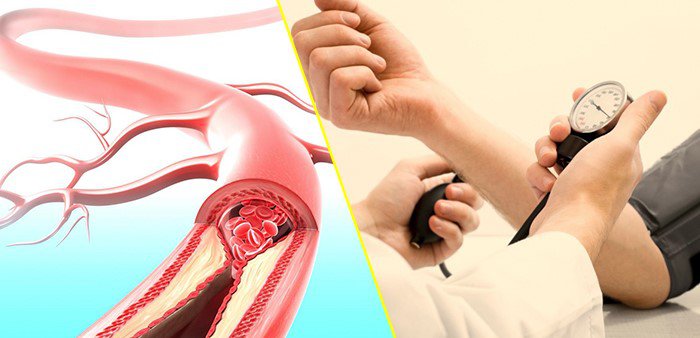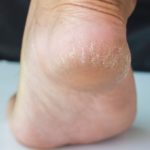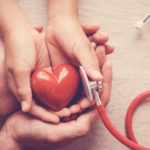Blood pressure depends on the amount of blood the heart is pumping (systolic pressure) and the resistance to blood flow in the arteries (diastolic pressure). The narrower the arteries, the higher the blood pressure. According to the International Society of Hypertension (ISH), blood pressure below 130/85mmHg is considered normal. Blood pressure from 130/85mmHg to below 140/90mmHg is considered normal – high. Blood pressure of 140/90mmHg or higher is considered high.

High blood pressure is a dangerous cardiovascular condition known as the “silent killer” because the whole progression of the disease often occurs silently without symptoms. High blood pressure (or hypertension) is a chronic condition where the blood pressure on the arterial walls is consistently high.
High blood pressure causes increased stress on the heart and is the cause of many serious cardiovascular complications such as stroke, heart failure, coronary heart disease, and myocardial infarction… Besides taking prescribed medication to control blood pressure, you can also consider some other effective home remedies for treating high blood pressure.
Home remedies for treating high blood pressure
1. Increase physical activity and exercise more
According to research, rhythmic and endurance exercises can significantly reduce blood pressure, especially in men. When you regularly increase your heart and breathing rate, your heart will become stronger and pump less. This puts less pressure on the arteries and lowers your blood pressure.

2. Lose weight if you are overweight
If you are overweight, losing 2 to 5kg can help lower your blood pressure. Additionally, you will reduce the risk of other potential health problems.
3. Reduce sugar and refined carbohydrate intake
Many studies have shown that limiting sugar and refined carbohydrates can help you lose weight and lower your blood pressure. According to a 2014 review, sugar, especially fructose, can raise your blood pressure more than salt. In trials lasting at least 8 weeks, sugar increased systolic blood pressure by 5.6mmHg and diastolic blood pressure by 6.9mmHg.
A 2020 study comparing different popular diets found that for people with overweight or obesity, a low-carb, low-fat diet reduced average systolic blood pressure by about 5mmHg and diastolic blood pressure by 3mmHg after 6 months. Another benefit of a low-carb, low-sugar diet is that it keeps you fuller for longer, as you are consuming more protein and fat.
4. Increase potassium and reduce sodium intake
Increasing potassium intake and reducing sodium intake in your daily diet can also help lower your blood pressure. Potassium helps counteract the effects of sodium in the system and reduce tension in the blood vessels. However, a high-potassium diet may be harmful to people with kidney disease, so talk to your doctor before increasing your potassium intake.
There are many natural foods with high potassium content, such as: Low-fat dairy products, such as milk and yogurt, fish, fruits (bananas, apricots, avocados, and oranges), vegetables (sweet potatoes, potatoes, tomatoes, green vegetables, and beans)
5. Quit smoking
Smoking immediately raises blood pressure and heart rate. In the long term, the chemicals in cigarettes can increase blood pressure by damaging blood vessels, causing inflammation, and narrowing arteries. Stiff arteries result in higher blood pressure. The chemicals in cigarettes can affect your blood vessels even when you are passively smoking.
6. Meditate or practice yoga
Mindfulness and meditation techniques help reduce stress. Yoga often includes breathing control, posture, and meditation techniques, which can be effective in reducing stress and blood pressure.
A 2013 review on yoga and blood pressure showed that the average blood pressure decreased by 3.62mmHg systolic and 4.17mmHg diastolic when compared to those who did not exercise. Studies on yoga practices that include breathing control, posture, and meditation have almost twice the effectiveness compared to yoga practices that do not include these three elements.
7. Try some folk remedies (herbs) for treating high blood pressure
Some herbal remedies have been proven to be the fastest way to reduce high blood pressure. However, further research is needed to determine the dosage and components of the most effective herbs. Always check with your doctor or pharmacist before taking herbal supplements. They may interfere with your prescribed medications. Some types of plants and herbs used to reduce blood pressure: Black beans, celery juice, Chinese hawthorn, ginger root, honeysuckle flower, sesame oil, tomato extract, tea
8. Establish a good and comfortable sleep pattern
Blood pressure typically decreases when you are sleeping. If you don’t get good sleep, it can affect your blood pressure. Sleep deprivation, especially in middle-aged individuals, increases the risk of developing high blood pressure.

9. Take supplements
These supplements have shown promise in lowering blood pressure:
Omega-3 fatty acids
Adding omega-3 fatty acids or fish oil to your diet can provide many health benefits. A meta-analysis of fish oil and blood pressure showed an average reduction in blood pressure of 4.5mmHg systolic and 3.0mmHg diastolic in people with high blood pressure.
Whey protein
This protein complex derived from milk may have some health benefits besides possibly lowering blood pressure.
Magnesium
Magnesium deficiency is related to higher blood pressure. A meta-analysis showed a small decrease in blood pressure with magnesium supplementation.
Citrulline
L-citrulline is a precursor to L-arginine in the body, a building block of protein, which can reduce blood pressure.
10. Limit alcohol intake
Alcohol can raise blood pressure, even in healthy individuals. It’s important to drink in moderation. Women should limit their alcohol intake to one drink per day, and men should limit their intake to two drinks per day. A review showed that although initially drinking more than 30 grams of alcohol can lower blood pressure, after 13 hours, systolic blood pressure increased by 3.7mmHg and diastolic blood pressure increased by 2.4mmHg.
11. Reduce caffeine consumption
Caffeine temporarily raises blood pressure. In a 2017 study, the systolic blood pressure of 18 participants increased within 2 hours of consuming 32 ounces of caffeine-containing beverages or energy drinks. Subsequently, blood pressure decreased faster in participants who consumed caffeine-containing beverages. Some individuals may be more sensitive to caffeine than others. If you are caffeine-sensitive, you may want to reduce your coffee consumption or try decaffeinated coffee.
Things to avoid when having high blood pressure
– Limit consumption of red meat (beef, pork), pastries, soft drinks, foods high in saturated fat or cholesterol (fat, organ meats, animal skin, egg yolks, fried foods); avoid or limit the intake of beer, alcohol, coffee…
– Patients with high blood pressure should have a bland diet, consuming only about 2-3g of salt per day because: The main component of table salt is sodium, and sodium can cause increased extracellular fluid, leading to rapid heart rate and high blood pressure. Sodium makes the blood vessels narrower than normal, impeding blood circulation and affecting the blood flow to the heart, causing high blood pressure. Therefore, it is necessary to limit the intake of foods that contain too much salt, such as pickles, salted vegetables…; processed foods such as instant noodles, sausages, bacon, canned foods…
– Keep warm during cold weather; avoid bathing late at night or in windy areas, especially for people with high blood pressure; do not bathe in water that is too hot or too cold, it is best to bathe in warm water; avoid situations of nervous tension, strong emotions, anxiety…; moderate lifestyle, eating, and resting; eat plenty of fruits and vegetables, avoid alcohol, beer, cigarettes, and stimulants; do not engage in excessive physical activities such as heavy lifting, running…; treat underlying causes of stroke such as high blood pressure, atherosclerosis, diabetes, arrhythmia…
According to An Nhiên – Vietnamnet
Unlock 8 Benefits with a Daily 5-Minute Jog
Living a hectic lifestyle can make fitting in time to exercise difficult. However, studies have revealed that even just 5 minutes of jogging a day can lead to positive outcomes for your health, including a decrease in the risk of developing cardiovascular disease, extending your life span by up to 3 years, or even reducing the susceptibility to heart disease.





































